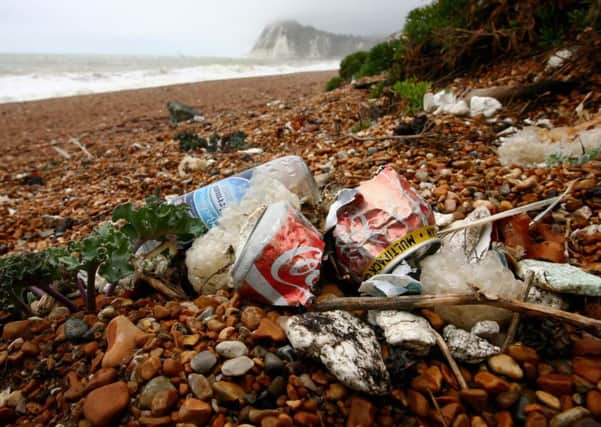Neil McNicholas: Why killer plastic should shame us all


The carcass of a six metre whale had been recovered from the waters off Bergen in Norway and the cause of death was found to be a total of 30 plastic bags it had ingested mistaking them for squid or jellyfish and which had completely blocked its digestive system. A local resident and environmentalist being interviewed for the programme wept as he said “How can we do this to nature?”
A post-mortem was carried out on a whale recovered off the coast of Scotland. Its digestive system was found to contain four kilograms of plastic bags ranging in size from supermarket fruit and veg bags to bin bags, as well as plastic netting.
Advertisement
Hide AdAdvertisement
Hide AdWhales and dolphins and turtles are getting entangled in discarded fishing gear – ropes, nets and cables. Fish are swallowing micro plastics – minute plastic spheres that are contained in shampoo, liquid soap, and cosmetics as part of their cleansing action. We flush them into our sewer systems and, being plastic and therefore not destroyed on the way, they eventually end up in the sea where they are swallowed by fish and, still unseen, we complete the cycle when we eat them in our fish dinner.
The origin of some of the pollution can be identified when there is a manufacturer’s name printed on plastic bags for example, but that doesn’t tell us how such detritus got into the sea in the first place. There are strict rules banning the dumping of rubbish at sea, but if a ship is in the middle of nowhere and no other vessels are around, then who knows what may get thrown overboard.
However, the sheer volume of plastic washing ashore would seem to suggest that much of it has simply been dumped into rivers, or thrown away on beaches, and some will also have been wind-blown into rivers and the sea as a result of uncontrolled and thoughtless disposal.
This brings us back to a recent column Jayne Dowle wrote in these pages about the on-going scourge of fly-tipping. She commented that despite fly-tipping in her local woods being featured on television, it hadn’t stopped people continuing to dump their rubbish there. She reported that the maximum fine for fly-tipping is £50,000 or five years in jail and yet clearly that doesn’t stop people.
Advertisement
Hide AdAdvertisement
Hide AdAnd there’s the rub as Shakespeare would say (or the rub/bish, as he didn’t). That the scourge of fly-tipping continues, and that vast volumes of plastic detritus continue to wash up on our shores, is sadly down to the fact that those (ir)responsible for it simply don’t care. That gentleman in Norway asked “How can we do this to nature?”
One of those joining him in cleaning up his local beaches said “I’m ashamed that we can do this to nature”.
The problem is that too many people are not at all ashamed and far from having any fear of being caught and fined or imprisoned, simply do not care what they are doing to the environment or to creatures trying to live in it – including ourselves.
For them it’s a case of “out of sight out of mind”, dumping their rubbish somewhere other than where they live, regardless of the consequences and the cost of clearing up after them – money that could be put to far better use like funding the NHS.
Advertisement
Hide AdAdvertisement
Hide AdIt is pointless trying to find words to shame such people especially as they don’t care what people think just as they don’t care what they are doing to the environment. Basically they are sociopaths – people who demonstrate an anti-social attitude which has no regard for the rules of society and shows no regret or guilt. “I feel so ashamed that we can do this to nature,” that person said. These people don’t – they don’t care – or at least they do but only about themselves.
Neil McNicholas is a parish priest in Yarm.